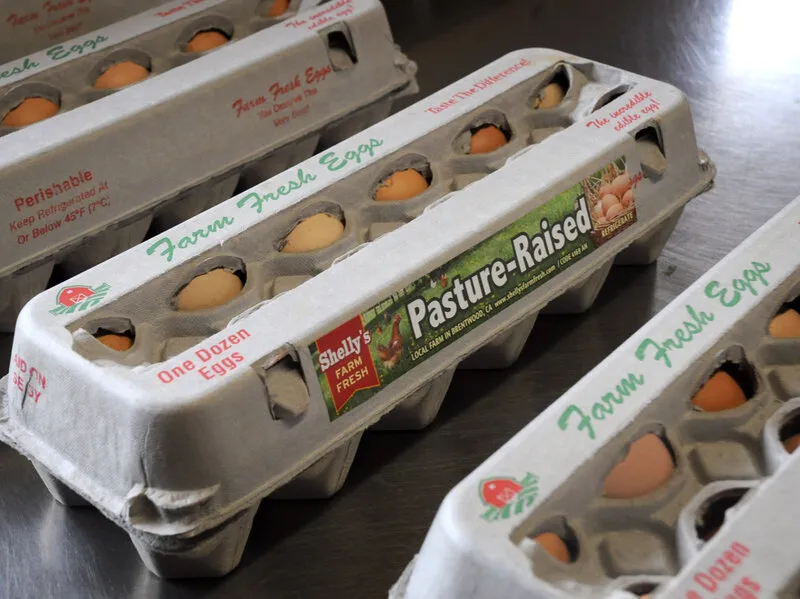What Eggsactly do the Labels on Eggs Really Mean?
As sure as eggs is eggs
This is a saying that is used when you are certain about something, but can you be certain about what the labels on egg cartons really mean?
There are several types of eggs to choose from such as Free Range, Organic, All Natural, Cage-Free and Pasture Raised.
When you go to buy your eggs do you know what you are actually choosing? Do you truly understand their meaning?
Below is a list of different eggs with a perception of what they mean followed by their actual meaning.
See if you change your mind about which eggs you buy after reading this.

Farm Fresh
What You Might Think It Means: Your friendly local farmer rises at dawn to harvest a dozen (still warm) eggs and puts them into this egg carton, which is rushed to your local store.
What It Actually Means: "It literally means nothing," says Paul Shapiro, vice president of the Humane Society of the U.S. and an expert on commercial egg production. He says the term is probably meant to conjure up a favorable image in the consumer's mind, but it has no substance whatsoever.
All Natural
What You Might Think It Means: Chickens eating a "natural" diet and doing what chickens, you know, naturally do.
What It Actually Means: Once again, this phrase has no real meaning. Shapiro says it's an ironic term, too, "because [conventional chickens] are raised in the least natural conditions imaginable."
Cage-Free
What You Might Think It Means: Chickens happily wandering around a big red barn, pecking at corn kernels on a hay-covered floor — like the feeding farm I used to visit with my grandma.
What It Actually Means: Exactly what it sounds like The hens don't live in cages. But they don't live in bucolic red barns, either. They usually live in aviaries: massive industrial barns that house thousands of birds. Each bird has, on average, 1 square foot of space.
Free-Range
What You Might Think It Means: Hens playfully strolling and tumbling down green hills, home on the range.
What It Actually Means: Free-range means cage-free plus "access to the outdoors." But as Mark Kastel of the Cornucopia Institute notes, this "access" typically means a few small doors that lead to a screened-in porch with cement, dirt or a modicum of grass. And often, Kastel says, industrial fans that suck ammonia out of the building create "hurricane winds" through the small doorways, "and the birds don't really want to walk through that."
Kastel claims that the vast majority of free-range birds in commercial egg facilities never actually go outside. So in most cases, he says, free-range means the same thing as cage-free. Unlike in poultry production, there's no government oversight of the term "free range" when it comes to eggs, so companies can more or less interpret it as they see fit.
Vegetarian Diet
What You Might Think It Means: Chickens enjoying a salad bar of grass, herbs, Brussels sprouts and kale — you know, their natural diet.
What It Actually Means: This is perhaps the most confusing claim because chickens are not vegetarian. They're omnivores that, in the wild, get most of their protein from worms, grasshoppers and other insects. Hens that are fed a "vegetarian diet" are probably eating corn fortified with amino acids.
Omega-3
What You Might Think It Means: The hens are fed a more healthful diet, which leads to eggs rich in omega-3 acids, which makes me smarter.
What It Actually Means: The hens are probably given a bit of flaxseed mixed in with their corn feed, possibly leading to higher levels of omega-3s in their eggs.
Organic
What You Might Think It Means: Chickens with hemp bracelets and yoga pants change the sign on their coop from "Chicken Coop" to "Chicken Co-op," then begin composting.
What It Actually Means: "Organic" actually means something very specific, and egg producers who use it are subject to USDA regulation. Organic eggs must come from chickens that are free-range (cage-free plus access to the outdoors), fed organic feed (no synthetic pesticides) and receive no hormones or antibiotics.
Pasture-Raised

What You Might Think It Means: Chickens dashing between the legs of friendly cows and sheep on a sprawling pasture of peace and harmony.
What It Actually Means: In terms of replicating chickens' natural environment and way of life, pasture-raised is pretty much the gold standard. Pasture-raised birds spend most of their life outdoors, with a fair amount of space plus access to a barn. Many are able to eat a diet of worms, insects and grass, along with corn feed (which may or may not be organic).
